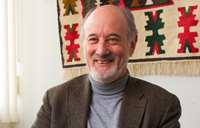“There were two defining international political events for those of us who came of age in the 1980s – the fall of the Berlin Wall and the release of Nelson Mandela from 27 years of imprisonment on Robben Island,” wrote Eugene Lang, the BMO Visiting Fellow at Glendon College’s School of Public and International Affairs, in the Toronto Star Dec. 9. “The iconic images of the wall being ripped down brick by brick, and of Mandela walking to freedom hand in hand with his wife, both of which occurred within 90 days of one another, are etched in our collective memory. To the politically aware twenty-something of that time, those 12 weeks at the end of 1989 and the beginning of 1990 made us believe the world was at a pivot point.” Read full story.
New railroad dangerous good rules called step in right direction
New federal rules force companies shipping dangerous goods by rail through Canada’s towns and cities to tell local emergency responders about it. But that information will only be shared after the fact, with a select few officials sworn to confidentiality. . . . Ali Asgary, a professor in York University’s emergency management program, said the direction is an important step. But he likened it to receiving yearly weather data versus an accurate forecast. “Hopefully this continues to become real-time information,” said Asgary in the Toronto Star Dec. 8. The emergency management expert agreed that it’s safer to limit who can access the data. “But it works only if this information is translated to the population, in terms of knowing generally what all these trains are carrying and how much they’re carrying and what they should know . . . about different types of hazard.” Read full story.
Sportonomics: York University students present case studies to real sports executives
This week Sportonomics visits York University’s Schulich School of Business, where the lessons learned in the Tourism and Sports Marketing course have real-world applications, reported the Toronto Star Dec. 9. Students presented their sports marketing case studies, but their audience went beyond their classmates and instructor. Pro sports executives also sat in, and offered the students feedback in real time. Watch full video.
Role of NHLPA to defend the indefensible in the spotlight once again
The role of the NHL Players’ Association in on-ice disciplinary matters has fallen under the spotlight again after two ugly episodes in Saturday night’s game in Boston. . . . But union officials say that the NHL’s disciplinary procedures under the collective bargaining agreement are not intended to condone or encourage on-ice misconduct. The union’s role, they say, is to ensure a fair and impartial disciplinary process, so that evenhanded and consistent league discipline will act as the most effective deterrent to bad play. “Union members can harass or harm other members in any workplace,” said York University law Professor David Doorey in The Glove and Mail Dec. 10. “Unions are obviously concerned about the victims in these cases, but that concern must be balanced against their legal obligation to represent members who are disciplined. It’s an unhappy position for unions, no matter the workplace.” Read full story.
Nobel prizewinner Alice Munro: ‘It’s a wonderful thing for the short story’
To say that Alice Munro inspires devotion among her readers is more than cliche: for Jonathan Franzen she is “the Great One”, for Margaret Atwood “an international literary saint”, for the New Yorker magazine, where her stories have appeared since the 1970s, she is “our blessing”. After years of consternation as to “why her excellence so dismayingly exceeds her fame”, as Franzen put it in an impassioned piece in the New York Times in 2004, this week her followers can finally be satisfied: Munro is Nobel Laureate for Literature. . . . In 1973 the Munros’ marriage was one of the many casualties of the new mood. She had a little money in the bank and a third book due out, but for the first time in her life she had to think about making a living, so she accepted a job teaching creative writing at York University in Toronto. She only lasted until Christmas, because she “was absolutely no good at it. I couldn’t stand it.” Teaching may have been a disaster, but moving back to Southern Ontario sparked a turning point for Munro personally and professionally. Read full story.
Law students can help solve Canada’s access-to-justice crisis
Canadians face an unprecedented crisis: a gulf between our shared belief that in a democracy, access to justice is a fundamental right, and the growing reality that only the rich can afford a lawyer, reported the Toronto Star Dec. 9. One idea that has a lot of support in theory – but that hasn’t gained as much traction as it should in practice – is making better use of students. . . . The American Bar Association requires that law schools make pro bono opportunities available to students. Law students at many leading U.S. law schools are required to complete a certain number of pro bono hours before they can graduate. There is no similar rule in Canada. And only one law school – Osgoode Hall Law School at York University – has a public interest graduation requirement. Read full story.
Companies taking over government’s product-regulation role
Would Canada’s northern cod fishery have been saved from collapse if it had been regulated by a private company instead of the government? . . . MSC stands for Marine Stewardship Council, one of a growing number of non-government verification bodies that put their stamp of approval on the products we buy. There are hundreds of them. And unless you spend time doing a bit of research, the only time you might notice them is a little logo on a box of crackers or package of frozen fish. . . . “It’s a multibillion-dollar industry,” said York University geography Professor Peter Vandergeest, who studies the global network of ecological certification systems. As governments regulate less, increasingly standards are being set not in Ottawa or provincial capitals, but by what are effectively global private businesses. And the change is not without controversy, said Vandergeest in CBC News Dec. 9. “What used to be a government role, you are now handing over to a private entity. [People are asking], how democratic is that?” Read full story.
Benign Machiavelli: Nelson Mandela was ‘as clever as he was virtuous, as cunning as he was bold’
There are some who argue the push for reconciliation, masterful as it was, came at a cost: socio-economic disparities produced by apartheid have not been fully addressed. Mr. Mandela’s [African National Congress] abandoned its policies for nationalizing industries and redistributing wealth. “You can argue this was a smart, judicious, pragmatic thing to do,” said John Saul, professor emeritus of political science at York University, in the National Post Dec. 6. “I think, myself, you could as easily say it was a sellout. This is a hard call.” But he does not blame Mandela as much as his party. “The ANC ditched the people, and they made a separate peace with capitalism, and the society is unequal and full of discontent because of it,” he said. Read full story.




 The annual President’s Creative Writing Awards is once again looking for submissions in four categories – poetry, short fiction, screenwriting and playwriting.
The annual President’s Creative Writing Awards is once again looking for submissions in four categories – poetry, short fiction, screenwriting and playwriting.
 novels, science, psychology, graphic, philosophy, political, classics, business, dictionaries, cookbooks, travel, labour, law, film, art, music, literary criticism, languages, media, biology and so much more.
novels, science, psychology, graphic, philosophy, political, classics, business, dictionaries, cookbooks, travel, labour, law, film, art, music, literary criticism, languages, media, biology and so much more.










